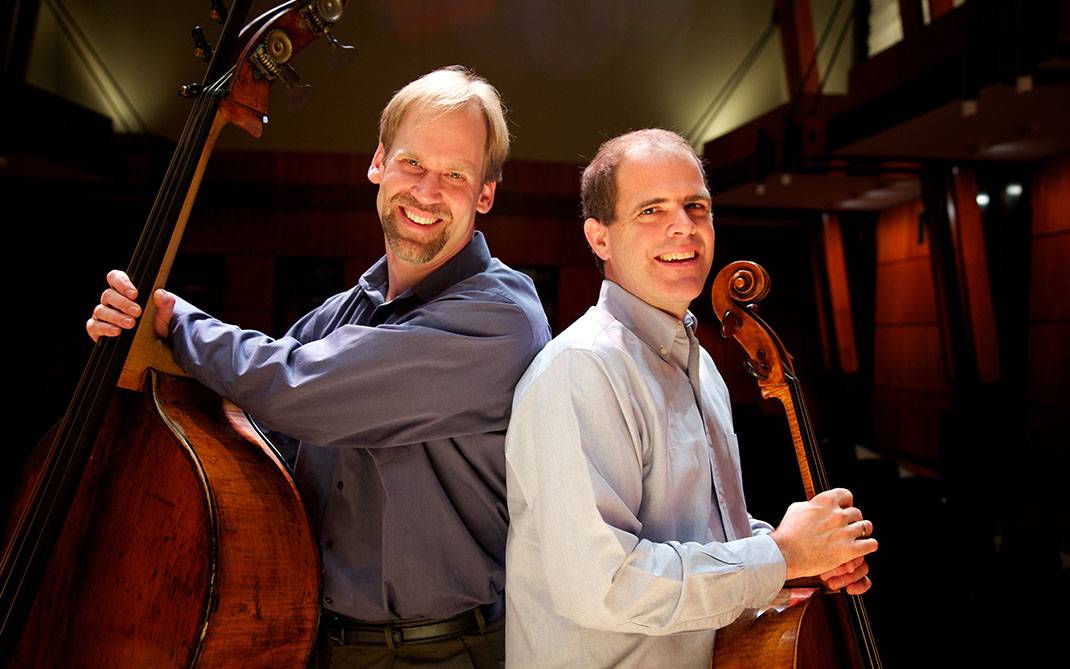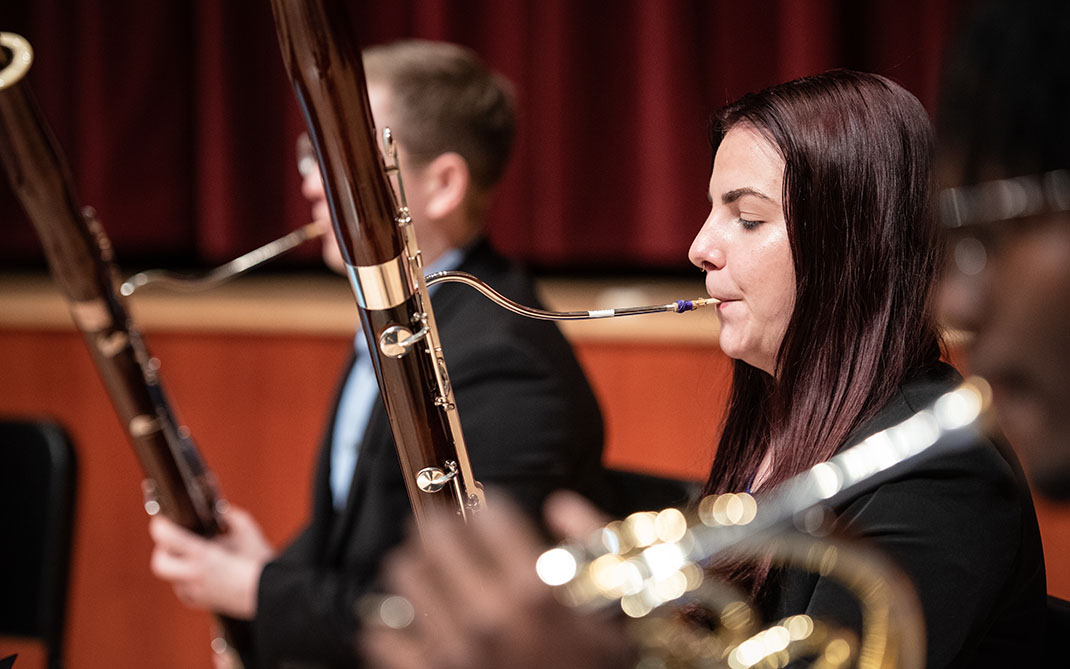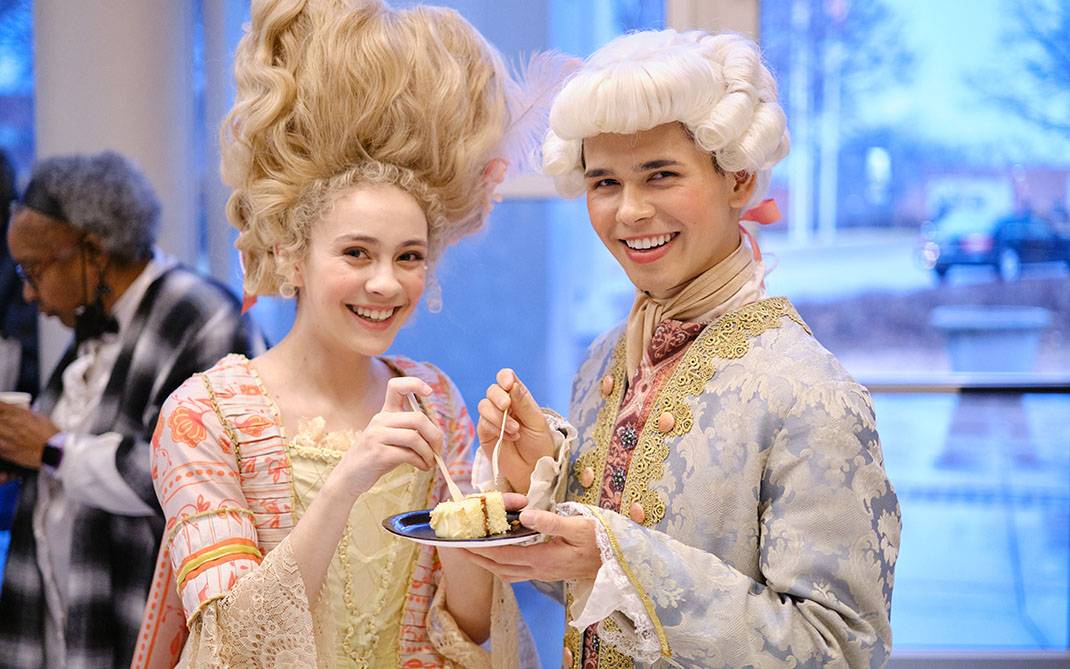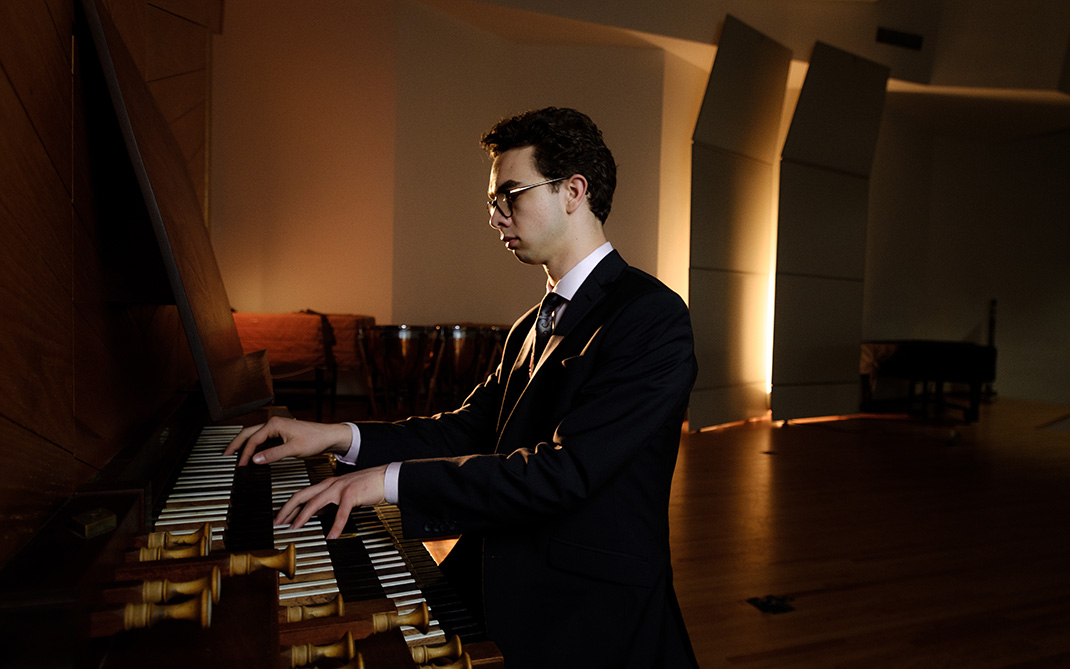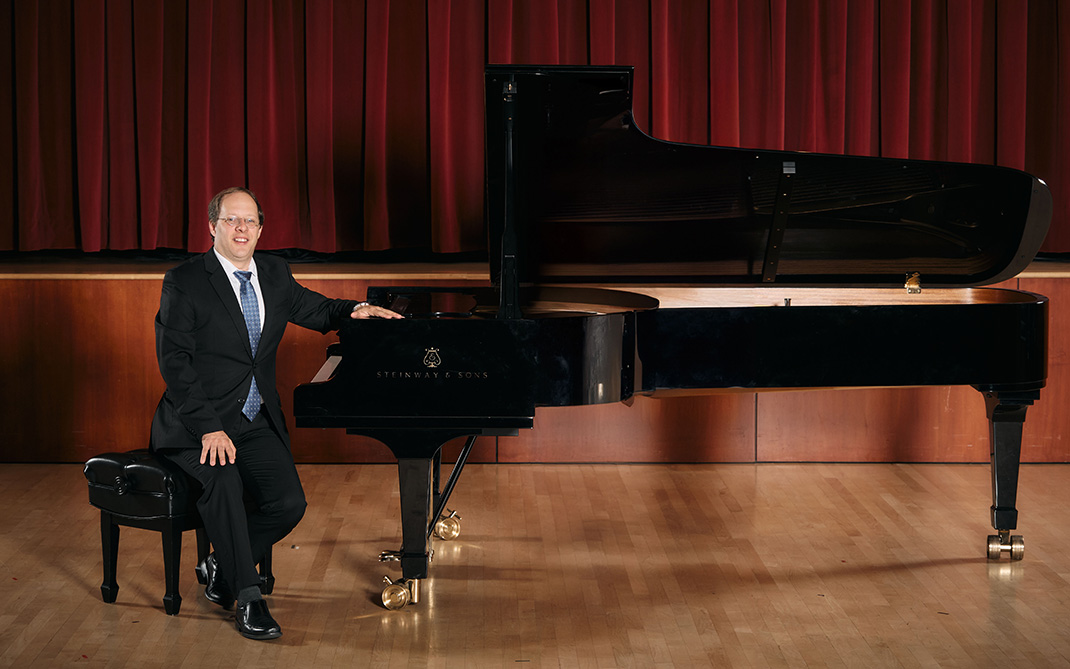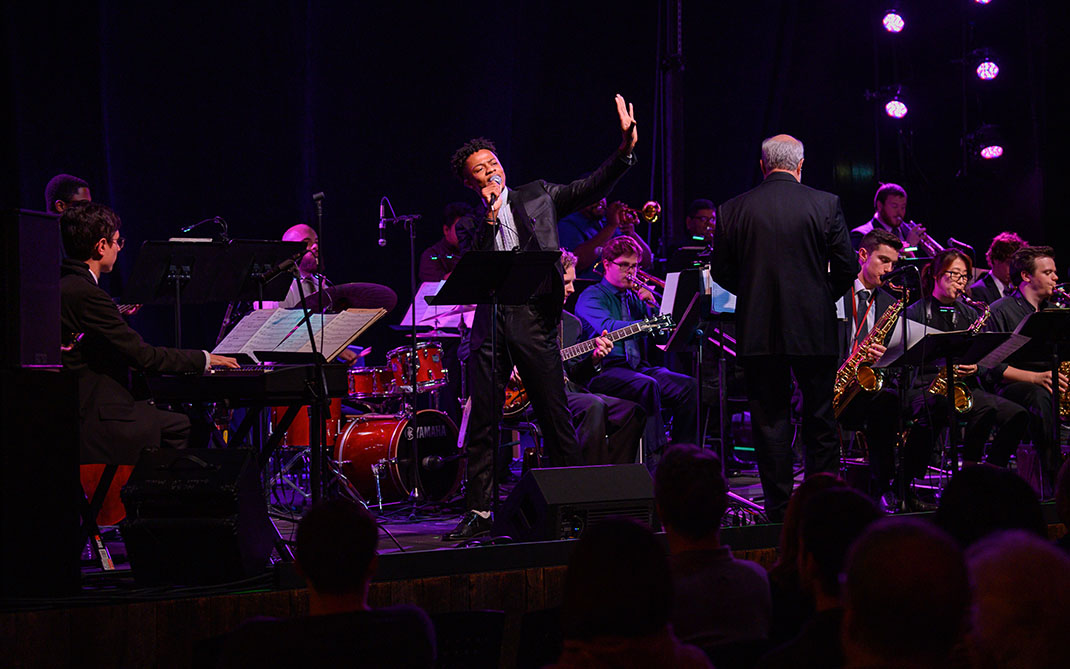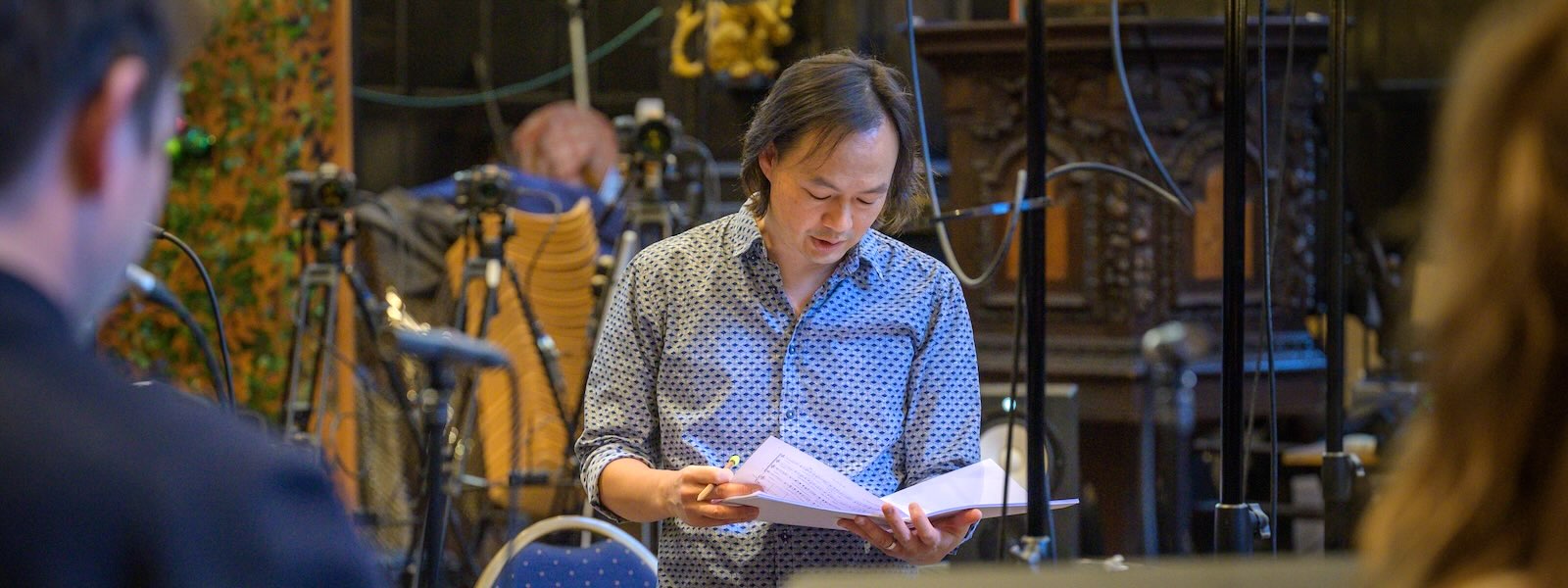Christopher Tin
Listen to the interview on Apple, Spotify, or your listening platform of choice. Captioned interviews are available on YouTube.
The views and opinions expressed by speakers and presenters in connection with Art Restart are their own, and not an endorsement by the Thomas S. Kenan Institute for the Arts and the UNC School of the Arts. This interview has been edited for length and clarity.
Christopher Tin is an award-winning and genre-bending classical composer whose work has been featured in a variety of settings and media, from august concert halls to the world of video games.
His orchestral piece “Baba Yetu,” which Christopher originally composed for the game “Civilization IV,” was the first ever musical work written for a video game to win a Grammy Award. It has since become a staple in choral and orchestral venues. He received his second Grammy for his debut album, “Calling All Dawns,” a multilingual song cycle.
Christopher has been as adventurous in his producing as he has been in his composing. He turned to Kickstarter to help him create his subsequent two albums, “To Shiver the Sky” and “The Lost Birds,” both of which explored ecological themes. Through his crowdfunding, he not only raised all the funds necessary to pull off both expensive projects but also deepened his relationship with his many ardent fans while making new ones, bringing them along on intimate tours through his entire creative and production process. “The Lost Birds,” which features the acclaimed British vocal ensemble VOCES8, was nominated for a 2023 Grammy and has been performed all over the world.
This past spring at the Kennedy Center, the Washington National Opera premiered Puccini’s unfinished masterpiece “Turandot” with a new ending composed by Christopher and written by Susan Soo He Stanton. The production and its new ending was a hit with critics and audiences alike.
In this interview, Christopher reveals how after decades of experimentation and success he’s finally stopped worrying whether his work was too popular to please the classical-music establishment, and he explains how he’s cultivated a legion of fans who encourage him to take ever bigger risks.
Pier Carlo Talenti: I am speaking to you right after you met a big deadline, I understand. What was the deadline for?
Christopher Tin: I had a couple of new choral pieces that were being performed in Colorado, in Denver, by the choir Kantorei. As composers do, we’re often revising right up to the last minute of the concert. I was doing that. I conducted half the concert, and Kantorei’s music director, Joel Rinsema, conducted the other half. It was a blast and a huge success, so t’s nice to be done with that project and moving on to the next one.
Pier Carlo: I know so many of your compositions explore something thematically. Did this one have a thematic viewpoint?
Christopher: This was two 25-minute choral pieces, and they each had their own theme. One of them is called “Transfigurations,” which explores the nature of change in the world, whether it’s corporeal or spiritual. The other one is a setting of poems by Bengali poet, Rabindranath Tagore, called “Gitanjali.” These are beautiful devotional poems, and it’s a setting of his poetry.
We plan on recording these two pieces with Kantorei, and we’ll be releasing that record next year. But if there’s a broad theme to tie these two together, I’d say this is probably my most spiritual record.
Pier Carlo: That’s the first thing I thought, of course, when I heard “Transfigurations.”
Christopher: Yeah. Yeah. This one’s definitely me tapping into a more philosophical side of myself, rather than one where I explore, for example, external phenomenon or history. This asks some deeper, more probing cosmic questions one might say.
Pier Carlo: Oh, I look forward to hearing them. What was the first piece you ever composed?
Christopher: Oh, boy! It was a little 12-bar blues, I think. It was for a theater project that I was also doing. I wrote a little 12-bar blues to be played on the trumpet. I think it was called “Jay’s Blues” or something like that. That was the first piece.
But then the second piece took a dramatic leap up in scope. It was a two-act musical that I wrote called “Such Sweet Thunder,” a reference to a Duke Ellington song. It was one of these projects where being a pretentious 17-year-old … . And those are the worst, by the way. [Laughing] Amongst pretentious 17-year-olds, I was particularly bad.
Pier Carlo: As long as you grow out of it by 25, I think it’s OK.
Christopher: [He laughs.] Jury’s still out on that note! No, just joking.
It was this two-act musical which was exploring the nature of art versus entertainment. The plot of the musical, which I wrote — there’s a reason I didn’t become a playwright — was basically about a world where a very well-known jazz singer — let’s say she’s patterned after someone like Ella Fitzgerald — has passed away. There’s a young aspiring artist who sees in her a model, somebody to try to follow in the footsteps of basically. She launches her career, and she’s struggling throughout the entire time with this dilemma, this duality, which we should say in my later years I’ve realized is a false duality. This character struggles with whether she should be an artist or an entertainer. I know that’s a very basic way of looking at the world.
Pier Carlo: But at 17, it’s an important question to consider.
Christopher: These are formative years of your creative education. What are you tackling here? Who do you want to be in the world?
In the first act — oh boy, this is so long ago — she meets a teacher who really pushes this idea that a true artist needs to be true to their art, be uncompromising and so forth. Then in the second act, she meets a manager who takes her on the road and says, “Look, yes, great, you’re creating art; that’s wonderful. But look, if you just sing the classics and the hits, you’re bringing a lot of joy to people.” That was the entertainment half of it.
To be honest, I cannot remember how I resolved it, what she realizes when she comes back. It’s something like she realizes that you can do both basically. You can bring artistic integrity to entertainment and entertainment to artistic integrity. This was a really obnoxious 17-year-old’s dissertation.
Pier Carlo: When and how did you realize it was a false duality?
Christopher: Oh, I only realized that a couple of months ago. [He laughs.]
Pier Carlo: Oh, OK, so it’s fresh in your mind! Please explain.
Christopher: You know what it is? OK, I’ll tell you. I have always approached writing music at an intellectual arm’s length in a way. The topics that I chose to write about, yes, they are very humanistic and they relate to a lot of people, but I also approach them very either intellectually or anthropologically in a way. You could say that a lot of my pieces, for example, “To Shiver the Sky” or “The Lost Birds,” deal with these human themes, but there’s often a bit of an academic distance that I put between myself and the theme. Either I do it through delving deep into the depths of history to find things to set to music or I use well-known poets, but I just keep myself out of the equation a little bit.
The pieces that I wrote earlier this year, one of them in particular, “Transfigurations” … . Now I should mention that “Transfigurations” has a libretto by a very, very celebrated and well-known choral librettist, Charles Anthony Silvestri. Now Charles Anthony Silvestri — we call him Tony, great guy — wrote a suite of poems for me based around this theme of transfiguration. The last of the poems, he called “Tat Tvam Asi.” Tat tvam asi is Sanskrit, and these are the words that are etched on a temple in the Kerala province. I can’t remember off the top of my head the name of the temple, and I’m sorry about that, but this is a very famous temple in India where people go for a pilgrimage. People are seeking answers.
When they go to this temple, they’re not allowed to just go up the mountain and check out this temple. You have to go through a long process of preparation before you go to this temple, and it takes at least 41 days. You have to follow a very strict diet; you have to do some pure acts of devotion; and you have to remove a sense of self in a way so that you can be this pure empty vessel as you climb up the hill. After going through this preparatory phase, you’re finally allowed to take the pilgrimage up to the mountain, and at the top of the mountain, there’s a temple. The words on that temple are “Tat tvam asi,” and that’s Sanskrit for “Thou art that.” In other words: It is you. The answer you are searching for is you. You are the solution to the problems. You are the person that you seek.
That is one of the most profound rituals in all of theism, I think. It’s this powerful message: You’ve been spending all the time looking for everything out there, the answer to your problems, and suddenly you are told you are in fact the answer to your problems. I think it’s a very profound awakening for the recipient of that message. It’s like, “Oh, my goodness.” It questions all of the underlying assumptions that you’d made about yourself and your life up until that point, and that’s very profound.
When I set this poem to music, courtesy of Tony, I had a similar awakening where I thought, “What if this whole duality, this dialectic that I predicated my entire creative life on, this idea of entertainment versus art, is just a false duality? What if that’s all just, forgive me for saying so, BS?” What does that say? What does that do to your creative process when you realize you’ve built and struggled with these opposing forces, and you created this false opposition between the two all your life, and suddenly you realize, “You know what? That’s just BS”?
Pier Carlo: What surprises me, hearing you say that you discovered the false duality just two months ago, is that looking back at your career, I see an artist who dismissed that duality decades ago.
Christopher: Well, I’m glad you say so.
Pier Carlo: How did you work through that? You are someone who composed art that spanned genres and didn’t seem to care whether it fell under the rubric of high art or entertainment.
Christopher: Well, I think that I’ve always deliberately balanced those two. “Let’s try to make something that if you look at it from an entertainment standpoint, yeah, it has plenty of the things that make it accessible but has a lot of depth to it for those of you who want to delve in deeper.” A lot of times that depth is not inserted via means that would alienate the casual listener. I mean, I tend to keep very familiar harmonic and structural frameworks to my music. I believe in parse-able forms, musical forms. I believe in development and repetition of ideas. These are things that can appeal to any music listener.
But if I want to get, for example, a little more avant-garde, I will do so but in moderation, and I will make a point of it. If I want to put a lot of subtext into the works that I do, then I do it in the lyrics or in the selection of the poems that I write or via thematic development. I think that you can put a lot into your music that gives it a lot of artistic integrity but doesn’t necessarily need to call attention to itself. I think that’s what gives a lot of music legs. If you can write something that upon first listen is enjoyable for one reason but upon the 50th listen is enjoyable for a different reason, then I think you’ve done something that has permanence. That’s the goal, to write music that has staying power.
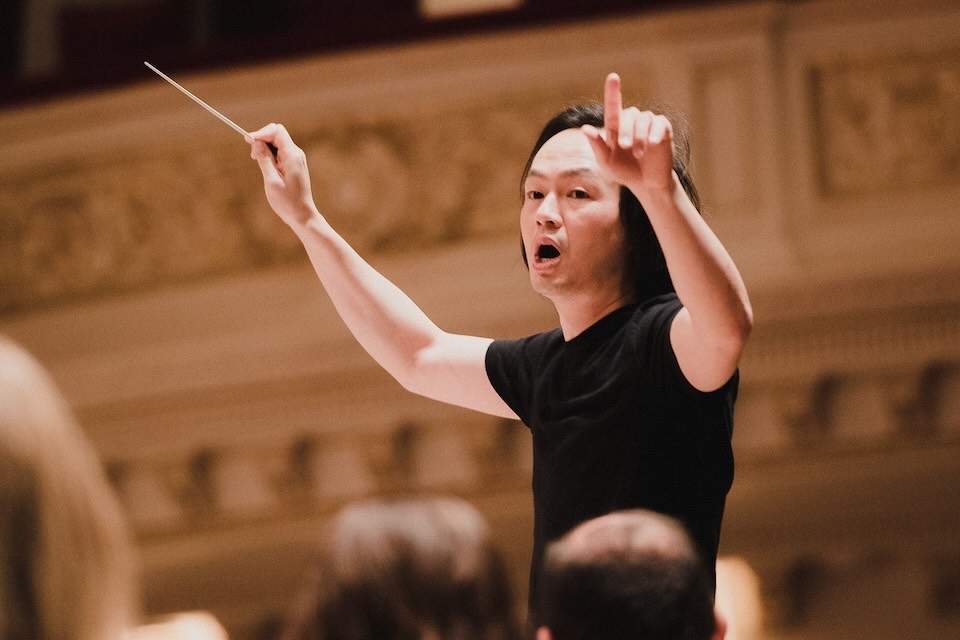
Christopher Tin conducting at Carnegie Hall; Photo: Dan Wright
Pier Carlo: Are you feeling the field as a whole changing? Are you feeling that leadership in the classical-music world are understanding that the duality does not need to exist?
Christopher: I think there will always be purists, but I think that at the end of the day, the thing that I hope that people recognize is that good music is good music. Whether or not it adheres to a certain trend in music, I would hope the decision makers in the classical industry can still understand that you can have it both ways in a way. There can be a piece that has mass appeal that also has a lot of craftsmanship to it and a lot of artistic integrity. You can program that, and people can write that music.
You asked me whether I see any change, and I do see a change in a way. I see more articles written about finding a happy medium between pulling in audience members and staying true to a tradition or the expectations of academia or history in a way. I also see people pushing on the side of saying things like film music and game music should be considered classical music. They make all sorts of very good arguments for why that should be the case.
But at the end of the day, I think also, as a composer, you just can’t be oblivious to the plight of the arts organizations that present your music. You know what I mean? I’m a very collaborative person with the performers, with the institutions that commission me. I’m here to make music that people like to perform and people like to listen to and that satisfies a lot of artistic needs of myself and maybe the broader intellectual community out there. I think it really does help if you approach everything with an attitude of like, “Yes, I’m going to make the piece that I want to make, but also I want to help you sell some tickets to this concert.”
Pier Carlo: We’re talking partly about your audience, and one thing that you’ve done, which is very 21st century, is the manner in which you’ve cultivated your fans. You’ve crowdfunded at least two of your albums, “To Shiver the Sky” and “The Lost Birds.” What convinced you to give crowdfunding a go four or five years ago?
Christopher: Well, four or five years ago, I was still under this perception — and this goes back to my false dualities that have handcuffed me all my creative career — I was under this assumption that real artists don’t crowdfund their albums.
Pier Carlo: Tell me more about that assumption. What did crowdfunding your album connote in your mind at that time?
Christopher: Crowdfunding my album just meant saying, “Oh, I’m just going to throw my hat in.” I am going to preface this by saying I no longer feel this way, so any people who have crowdfunded anything ever, please do not take what I’m about to say seriously. But at the time, I thought successful artists don’t need to crowdfund, so they don’t do it.
Pier Carlo: Because the money will fall out of the sky from another source.
Christopher: Exactly. The successful artists, they just got the money rolling in.
What changed my perception is I saw a couple of very successful fellow composers launching crowdfunding campaigns that were hugely successful. I thought, “Well, if those guys are going to do it, then I should do it.” That’s what led me to start crowdfunding.
What was miraculous about crowdfunding is that for the first time I really got a metric for how large and devoted my fan base could be. There aren’t a lot of metrics for that, but when you ask people to pony up money to bring your next album into the world, then you get a real sense of how much people are willing to support your music in real dollars, not just with a like or a tweet or whatever. In doing that first Kickstarter campaign, I actually found that I really enjoyed talking about my creative process.
I don’t necessarily like shooting videos about it. Many of us got thrown into this uncomfortable position of being content creators in the last decade. Many of us just would rather actually make music and not content for social media. But at the same time, I really do like talking about issues of creativity, especially my own work and how I approach it. Crowdfunding gave me that platform, and I found that it was a very exciting thing for my funders too. They want to know how I go from nothing to a full release with just a concept of an idea for the theme of the album.
Pier Carlo: Because your videos really show them how the sauce is made. You take them into the rehearsal process, the recording process, right?
Christopher: Yeah, everything. As the years have gone on, I’ve become less filtered about what I present to them as well. I think the whole point is to invest them creatively in the process and also just to get a lot of the ideas out into the world that sometimes I live with when I’m creating a piece but if I don’t actually write about it or make a video about it just fall by the wayside.
Making Kickstarter videos for my backers was a great way in a way to journal my creative process. By journaling your own creative process, you also get insight into who you are as an artist. When you have insight into who you are as an artist, you can more efficiently and effectively be an artist. That’s what I’m still working on at the tender age of 48, being a very efficient composer and one very in tune with his strengths, maybe his weaknesses as well, and understanding the optimal way that I work in bringing music into the world.
Pier Carlo: I’m thinking that one potential double-edged sword of being that connected to your audience is that it might inhibit your adventurousness. In other words, you might be afraid to offend them or give them something you suspect they wouldn’t like. Does that ever cross your mind?
Christopher: No, no, it doesn’t. In fact, if anything, the things that inhibit my creative process the most are not my audience. In fact, they’re the ones who encourage my creative process in the most.
Pier Carlo: That’s great.
Christopher: What inhibits my creative process the most is those phantom voices in my head, either from critics or former music professors who said, “You know what? You’re not writing real music. We can’t take this seriously. It’s got a melody or it’s tonal or whatever.” That is what really suppresses my creativity. These voices still pop up from time to time.
As much as, for example, young composers that I talk to have a very open-minded approach to what classical music is, how one should compose, the freedoms in which one can compose now, there are still a lot of people out there who will say, without even listening to your music, “He writes for video games. That can’t be serious music. That’s got to be crap.” There will be people who just write you off just like that. It still happens. All you can do is, as a wise woman said, shake it off.
Pier Carlo: Looking at “To Shiver the Sky” or “The Lost Birds,” would either of them have happened without the crowdfunding effort?
Christopher: No.
Pier Carlo: Really?
Christopher: No. That’s the other thing that I’ve really discovered, that the reason the earlier releases that I did took so many years between them was because I basically had to recoup the funds and then fund the next one. I was able to do “The Lost Birds” only two years after “To Shiver the Sky” because crowdfunding accelerated that schedule for me. Without it and, again, without not only the financial reassurance that came from my backers but the moral and creative reassurance that you get when thousands of people around the world are helping you break crowdfunding records, that gives you a lift in a way.
We are still human beings as composers. Yes, things like bad reviews hurt us and things like good reviews encourage us and things like audience appreciation encourage us. I mean, we’re just humans. I’ve found that connecting with my fan base is tremendously enabling in terms of my creativity. They back me not only via donations, but they encourage me to write what I want to write and write what they want to hear. That’s a relationship that I treasure. I really treasure my fans above anyone else.
Pier Carlo: Looking back now at when you first started your first Kickstarter, what do you wish you’d known then that you know now?
Christopher: I think that sometimes I can get a little carried away with this whole sharing/creating content for Kickstarter campaigns. The first time around, I had a full-time assistant whose job it was to help me make videos of my creative process. These were very elaborate behind-the-scenes videos. I think now that I had misplaced priorities. The priority is not to dazzle people with graphics or whatnot.
Pier Carlo: It’s the intimacy, isn’t it?
Christopher: Yeah, it’s the intimacy. It’s just being you. I think that when I did that first Kickstarter, maybe five years ago, I guess it was, there was still a lot of me being on guard. In my mind, there was always somebody just waiting in the wings ready to pounce on me for writing something accessible or for my latest video game score or whatever. There was always this idea that there was somebody out there to get me.
I think since then, I’ve realized [laughing], you know what? Forget it. Forget all that stuff. Just make music. Just revel in the process of making music. Don’t worry about the naysayers. They may not even exist. This may just be phantom voices in your head from your early musical education. Just do your thing, make good music, make your performers happy, make your audience happy, do it as best you can, and the rest takes care of itself.
Pier Carlo: I’m guessing when you accepted the commission to complete “Turandot,” there were a lot of voices in your head because in this case you were tasked with completing one of the great operas from a classical master. Did you have to convince yourself to take it, or was it a welcome challenge?
Christopher: Oh, I didn’t have to convince myself at all. I mean, I am a little bit foolhardy. If something gets plopped in my lap, I just say, “Yeah, let’s do it,” and I figure it out later. By the way, that’s a very entertainment industry mindset. We never say no to a gig. We just say, “Yes, sure, I can do that,” and then we figure out how to do it later on.
Pier Carlo: Well, I’m not sure everybody has that, but it’s a good thing to note.
Christopher: To make it in the movie or the game business as an artist, sometimes you do have to have a bit of a bravado. I think bravado is in a way what carried me through it. It’s very appropriate to “Turandot.”
Pier Carlo: How did you cultivate it?
Christopher: Well, first of all, being asked to do it in the first place is a vote of confidence in a way. Secondly, I’m not the first person to try to finish “Turandot.” I’m not even the last. [He laughs.] There’s already been another version out there. I figured if I failed, I would just be like any of the other composers who have tried to step into Puccini’s shoes and not quite lived up to him. There’s no shame in that. It’s Puccini. It’s “Turandot”, right? If you just write another ending and it just goes by the wayside, like some of the others have, nobody’s going to think any less of you.
But that said, I took it very seriously. I did a lot of scholarship. I talked to Puccini scholars. I read articles. I studied the scores for about five years. I listened to nothing but “Turandot.” It was an enormously high-pressure gig, and I wanted to do a good job. When the reviews started coming in saying that I did do a good job, particularly the Italian reviews … . Yeah, if the Italians think you did a good job, then heck, that means a lot to me.
Pier Carlo: As a composer and a conductor, you continue to work with a huge range of musical talents. From what you’ve observed, what qualities do you think a young musician in any field ought to develop to thrive in today’s performing-arts climate?
Christopher: I think being collaborative is huge. I think that this is something that I learned working through “Turandot.” Being flexible, being willing to work with people and being willing to say that it’s just not just my show and I’m the boss here. If the director needs something that you slaved away for weeks to compose cut because of dramatic reasons, do the cut. The people that you work with are there to help you bring good music and good drama, good storytelling into the world. You need to not fight them.
I think there is an attitude that you get amongst composers of a certain generation or who came up in a certain style or system where it’s like, “No, you do not touch my music. This is handed down from God. You do not change it. I’m the composer. I’m the boss.” Yeah, you can adopt that attitude, but people would rather work with a person who is a little more collaborative. At the end of the day, you may or may not get that call again to be commissioned to write your next work.
I always want that call, and it helps that I like working with people. At the end of the day, I think that when somebody says they have a very good reason why you should cut this piece that you’re really attached to, listen to them and consider their viewpoint. I’ll tell you with “Turandot”, there was a musical number that I had written — it was a choral number — and it just did not work dramatically. A few days before the premiere, we cut it. There’s actually footage of me sitting in the lobby of SiriusXM on my iPad, scribbling down on the score cuts and how we’re going to rewrite some of the strings and things like that.
I think this is an attitude that those of us who have worked commercially in the film, video game, record business, whatever it is, we’ve just learned to be very collaborative because it’s rarely just us making something. I think that’s an advantage that people who come from that world have. We just are used to doing a lot of things and making it work and setting our own need to be right at all times. We’re setting that aside.
November 18, 2024
